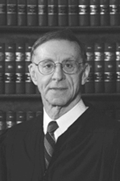Albert Rosenblatt recuses himself on May 31; role of daughter’s legal advocacy unclear
Potentially complicating the four gay marriage lawsuits that will be heard by the state’s highest court on May 31, Associate Judge Albert M. Rosenblatt, one of the court’s seven justices, has recused himself.
“They hear cases with six judges routinely,” said Gary Spencer, a spokesman for the Court of Appeals. Rosenblatt, who is viewed as a swing vote on the court, did not give a reason for recusing himself.
“They don’t as a matter of tradition and policy,” Spencer said.
If the remaining judges should deadlock in a three-to-three vote, the six judges would select a seventh judge to review the briefs and oral arguments and break the tie, Spencer said.
Attorneys at Lambda Legal, the gay public-interest law firm, and the American Civil Liberties Union (ACLU) said that Rosenblatt had not been asked to step down by any parties. The ACLU and Lambda will argue two of the four cases. Attorneys from New York City’s Law Department and the state attorney general’s office will argue against gay marriage.
Rosenblatt may have recused himself because his daughter, Elizabeth L. Rosenblatt, an attorney at the Los Angeles-based firm Irell and Manella, worked on friend of the court briefs on two Lambda cases.
One is the New Jersey gay marriage case—a decision from New Jersey’s highest court is expected this year—and the second is a lawsuit brought by a California student against his school district for barring him from establishing a gay-straight alliance.
If this family tie is the reason, experts in legal ethics said Rosenblatt did not have to leave the case.
“Judge Rosenblatt did not have to recuse himself,” said Stephen Gillers, a professor at New York University’s School of Law. “He could have chosen to remain if that is the reason.”
Monroe H. Freedman, a professor at Hofstra University’s School of Law, agreed.
“A judge is required to recuse himself if, among other things, his impartiality might reasonably be questioned,” Freedman said. “I would not say that the judge’s daughter’s involvement with gay rights cases in other courts meets that standard.”
Rosenblatt was appointed to the court in 1998 by Governor George E. Pataki. His first judgeship came in 1976. Now 70, he will resign from the court at the end of this year.
Rosenblatt may be trying to guard the integrity of the Court of Appeals by not sitting on a case in which he is even distantly involved with one of the parties.
“Judges may recuse themselves even if they don’t have to,” Gillers said. “Judges may step aside because they want to ensure that the public has confidence in the result.”
Even if Rosenblatt does not have to quit the case, he may be trying to protect his relationship with his daughter.
“The recusal standard is objective,” Freedman said. “It’s what a reasonable person might question… If a reasonable person might question his impartiality, that’s enough. At the same time, if a judge decides that this case does not fall in that category, a judge can make a subjective judgment that he is not comfortable, because of his family situation, about his ability to lean one way or another.”
Freedman added, “I would not want to be sitting on a case in which I knew that one of my children had a very strong interest in the outcome.”
While it is routine to “vouch in a judge,” as Spencer put it, after a deadlock, recruiting a tie-braker could also create problems.
“That means that judge has a lot of power,” Gillers said.
Other than confirming that no party had asked Rosenblatt to leave the case, none of the parties responded to requests for comment. Elizabeth L. Rosenblatt did not respond to a phone message and an e-mail seeking comment.
gaycitynews.com



































